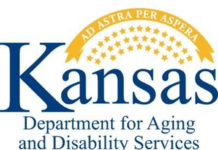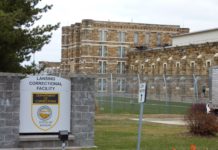A panel studying criminal justice reform in Kansas is urging the Legislature to spend almost $50 million for new beds for prisoners suffering from substance abuse or older inmates needing cognitive care.
The Kansas Criminal Justice Reform Commission on Monday recommended spending as much as $14.5 million to renovate state buildings to add up to 500 beds for inmates with substance abuse problems or geriatric prisoners.
The yearly cost of operations for both facilities — up to 250 beds each — would be an estimated $13 million.
The panel also recommended that the Legislature allocate about $21 million to build a 240-bed substance abuse treatment center for male inmates.
The panel made adding prison beds for inmates with substance abuse issues its priority.
The recommendations, due by Dec. 1, will be included in the commission’s report to the Kansas Legislature. The commission was created by a bill passed this year.
It was charged with looking at various criminal justice reforms, including sentencing, specialty courts and diversion, among other issues.
The recommendation for new beds comes at a time when the state corrections system has been grappling with overcrowding. The corrections system is brimming with prisoners, and the situation is only expected to worsen with time.
The recommendation would meet the agency’s need for beds in the next three to four years, said Corrections Secretary Jeff Zmuda. “It would help if we stay on the same growth path.”
The prison system has seen a gradual increase in its senior population in recent years.
In fiscal year 2013, there were 397 inmates who were 60 and older. By fiscal year 2019, that number had grown to 660, or an increase of 66%. The 65 and older population has increased by about 76% over the same time frame.
Zmuda said mixing senior inmates with cognitive problems with the general population is risky.
“More and more, we’re seeing cognitive care issues, whether it be Alzheimer’s, dementia or just not quite having all their faculties,” Zmuda said.
“It’s a population that’s just a little more infirmed,” he said. “Having them out in the general population can be a little bit problematic, where they can potentially be taken advantage of.”
Zmuda said about 50% of the prison population suffers from substance abuse problems. He said it’s important to separate those inmates from the general population so they can focus on their treatment while incarcerated.
Attorney General Derek Schmidt favored the specialized facilities for substance abusers, saying that prison treatment facilities haven’t kept up with the number of people who are convicted with substance abuse problems.
“Right now, we either take somebody out of the community for the benefit of the community based on their misbehavior and we put them in a prison where they may or may not get drug treatment and mental health services,” Schmidt said. “Or in order to avoid putting them in prison, we leave them in the community in some manner.
“Sometimes those choices are sensible, but not every time. Sometimes there are choices when, for the benefit of the community, the individual needs to be removed but they don’t need to be locked up in a general population prison.”
About a decade ago, lawmakers passed special sentencing provisions intended to identify low-level offenders who suffer from substance abuse.
The law, he said, called for sending those offenders to a specialized facility where they could get treatment. He said the facility was never built.
Republican state Rep. Stephen Owens, a member of the commission, said the Legislature might be more receptive to the funding recommendations because they’re directed toward specific populations.
“Just expanding prison beds for the sake of expanding prison beds isn’t going to get a lot of traction,” Owens said. “Expanding prison beds to address substance abuse and mental health, I think, will. I think the Legislature, as well as the state, really understands the need to address substance abuse and mental health.”
The commission also recommended that the Legislature adopt recommendations of the Mental Health Task Force Report to implement and fund a comprehensive plan to address state hospital capacity needs.
It urged the Legislature to add a total of 36 to 60 beds to Osawatomie and Larned State hospitals within 24 months, which could cost up to about $20.5 million a year.
It also recommended adding up to 221 new regional or state hospital beds within five years, including those added in the first 24 months, at a cost of up to $55 million a year, assuming 60 beds are brought on line within the first two years.
The panel also encouraged the Legislature to address staffing at state hospitals by spending between $10.8 million and $11.3 million a year reducing employee turnover, conducting a market analysis for wages, and hiring a sufficient number of employees to ensure quality treatment.














